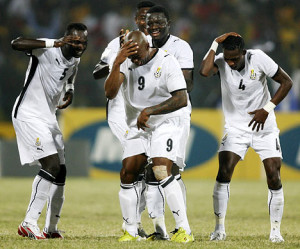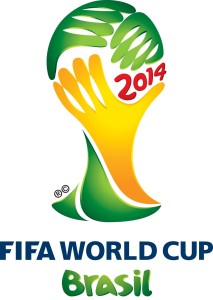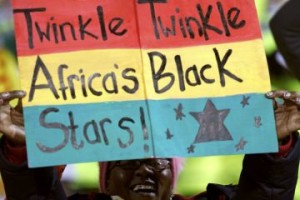Can an African nation win the world cup?

“No, the mentality of African teams will hold them back at the World Cup” – John Barnes
When Cameroon became the first African nation to get to the quarter-finals of the World Cup in Italy, 1990, the world began to take notice of African football. And even though football fans across Africa are hoping that one of their World Cup representatives will reach the semi-finals, or even win the tournament in Brazil this summer, Liverpool legend John Barnes believes that the mental aspect of the game is holding the continent back.
Before England played against Cameroon in the quarter-finals of the 1990 FIFA World Cup in Italy, the fans, commentators and the entire English team were very confident that they would teach the Cameroonians some football lessons. But instead, Roger Miller and his Cameroonian teammates taught England to respect their opponents, even if they are Africans.
Cameroon almost won the game but for a Gary Lineker’s late penalty that took the game to extra time, which resulted in a 3-2 win to England. Although Cameroon lost that game, they made the world sit up and take notice of what an African nation can do.
Since 1990, African football has come forward in leaps and bounds. Most observers will remember the impact of African players in European clubs; players like Samuel Eto’o, JJ Okocha, Taribo West, Abedi Pele, George Weah, Tony Yeboah, Quinton Fortune and Lucas Radebe. Did I mention Roger Miller?
They were great individuals who came from nothing to make their mark on soccer. But while Africa has always produced talented footballers, a team has not made a major impact until recently.
In 1990 Nigeria made it out of a group which included Bulgaria and Argentina, and in 1998 Nigeria shocked many spectators when they made it out of a group with Spain and Paraguay. The whole world was shocked when Senegal began the 2002 World Cup in Seoul by beating France in their opening game. Now, every nation has learnt to respect and take an African football teams seriously.
All this notwithstanding, Liverpool legend John Barnes believes that the mental aspect of the game is holding the continent back.
Barnes, who currently works as a commentator and pundit for ESPN and SuperSport thinks he knows why Pele’s 1997 prediction that an African nation would win the World Cup before 2000 did not come to pass.
According to BBC Sport, Barnes said “What Pele saw was the physical attributes that African players have, but what he probably didn’t take into consideration is the mentality necessary to win the World Cup.”
“It’s not just about physical ability, it’s about your mentality. I suppose that’s where African and other developing football countries such as Jamaica have to improve.
“Ivory Coast striker Didier Drogba has shown that African players can compete with anyone. The mentality is important, as is the discipline, the desire, the determination and the respect.
What I’d like the African players and those from a lot of the other developing football countries to do is to play for their countries with the same desire, respect and humility that they have when they play for their European clubs.”
Some of Africa’s greatest players such as Togo’s Emmanuel Adebayor, Peter Odemwingie of Nigeria and Samuel Eto’o of Cameroon have had well-documented fall-outs with their national federations.
Areas of contention have included players not being paid on time, poor travel arrangements, inadequate preparations, lack of communication and other administrative issues.
And while this has surely affected the performance of their national teams, Barnes does not blame the players.
“It’s understandable considering the way that the players are treated by the administrators. They’re treated much better in Europe, and players have to be made to feel wanted,” he said.
“Because of the challenges that the African and other developing football countries have, things aren’t going to be perfect. When Drogba plays for Galatasaray he gets first-class treatment, but when he plays for Ivory Coast maybe he doesn’t, because maybe the organisation isn’t great.
“So I’m not blaming the players, but if you ask what the solutions are, that is one – to improve the organisation. Maybe we’re disappointed that an African country hasn’t won the World Cup, but to me what the players have achieved is ok; their achievements are acceptable.
“Maybe you could say they could have a better attitude but we’re human beings and it’s understandable that it affects you.”
It seems there is a lot to be done before an African team can go beyond the quarter-final achievements of Cameroon in 1990, Senegal in 2002 and Ghana in 2010.
Barnes is convinced that a South American team will be world champions this year on their own continent, and amongst the African teams he believes that Ivory Coast will go the furthest.
“Like Pele, I look at the physical qualities that players have and I’m hoping that they can adopt the correct mental attitude to be successful, and that is why I always have hope for Ivory Coast because physically and technically they are equal to any country in the world,” said Barnes.
 “I always hold out hope for their mentality to rise and their discipline to get better.
“I always hold out hope for their mentality to rise and their discipline to get better.
I can’t see anyone getting past the South American teams, but I believe that out of all the African teams Ivory Coast will do the best.”



